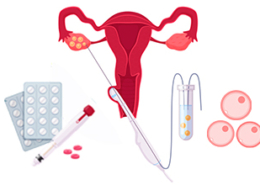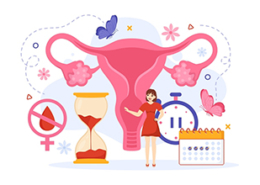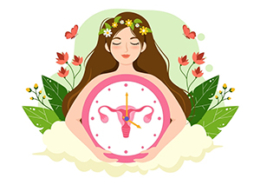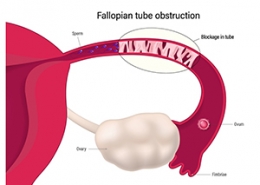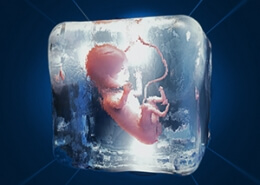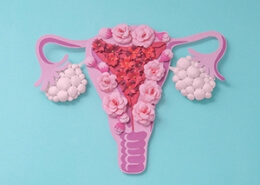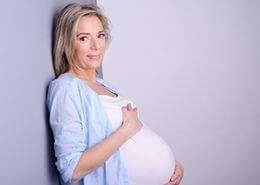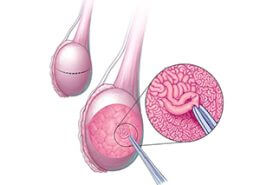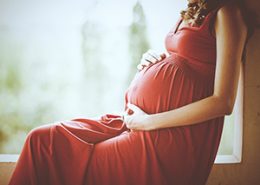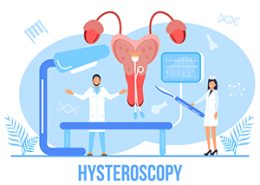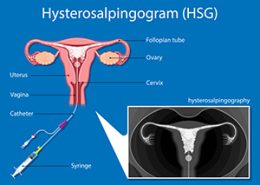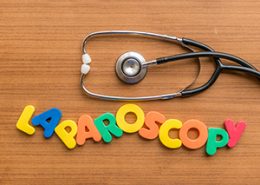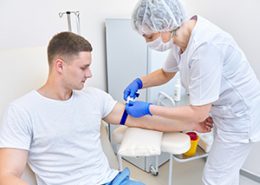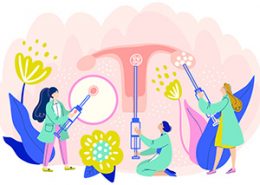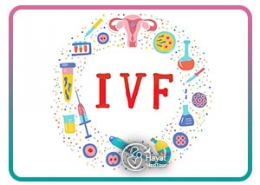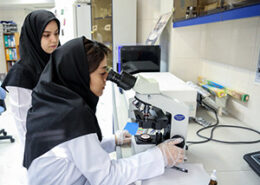pregnancy after premature menopause
After puberty, the production and secretion of female hormones begins in the body of women. These hormones control the cycle of ovulation. Normally, the ovulation process continues until about 45 years old. Usually, after the age of 45, when menopause occurs, the functioning of the ovaries is disrupted ovulation stops completely and the person will not be able to conceive naturally. In a few cases, women experience premature menopause (Early menopause).
Sometimes, some conditions cause menopause to happen before the age of 40, which is called premature menopause. Many women do not expect to experience menopause before the age of 40, and early menopause may cause them to worry and despair about having children. Although getting pregnant after early menopause is associated with challenges, it is not impossible. If a person notices the symptoms of premature menopause in time, she can get pregnant using assisted reproductive methods such as IVF and ICSI. If the quality of the eggs or the ovarian reserve is not suitable for IVF, pregnancy is still possible using donated eggs.
In this article, we will introduce the causes and symptoms of early menopause, its effect on fertility, and the solutions available for pregnancy after premature menopause.
What is premature menopause?
The condition where the ovulation cycle stops before the age of 40 is called premature menopause. Premature menopause occurs when menstruation has stopped for 12 consecutive months. Premature menopause affects about 1% of women under the age of 40.
Some symptoms of polycystic ovary syndrome (PCOS) are similar to premenopausal. Sometimes irregular menstruation in polycystic ovary syndrome may be confused with premature menopause. Therefore, it is difficult to distinguish ovarian laziness (ovarian insufficiency) from premature menopause in appearance and requires medical examinations and hormonal tests such as AMH, FSH, and LH. Learn more about fertility tests for women: the examinations and analyses necessary for women before starting infertility treatment and IVF.
What are the causes of premature menopause?
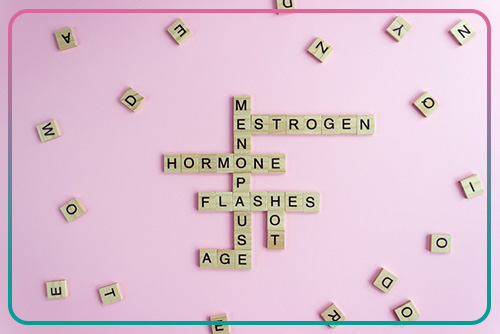
A decrease in the level of estrogen and progesterone hormones causes menopause. Estrogen regulates the menstrual cycle and progesterone prepares the body for conception. Premenopausal periods begin when the production of these hormones by the ovaries decreases. Over time, the ovaries’ production of estrogen and progesterone hormones decreases and eventually stops altogether. At the same time as the production of hormones stops, menstruation also stops. Menopause symptoms usually appear after the age of 45. However, people suffering from premature menopause are affected by these symptoms at a younger age.
Premature menopause can sometimes occur naturally without a cause, and sometimes it can occur due to factors such as chemotherapy and some surgeries. Premature menopause occurs naturally when a woman’s ovaries reduce or stop producing certain hormones, especially estrogen. The cause of premature ovarian failure is often unknown, but in some cases, it may be caused by the following reasons:
-
Genetic diseases
genetic disorders are the most common causes of premature menopause, which include 30% of the causes of premature menopause. Genetic disorders such as Turner syndrome, trisomy 13 and 18, genetic metabolic disorders, and immunological and autoimmune disorders are among the causes of premature menopause.
-
Suffering from some underlying diseases
suffering from diabetes, thyroid disorders, lupus and rheumatoid arthritis, Addison’s disease, etc. can increase the possibility of premature menopause.
-
Infectious diseases
Mumps disease is one of the most common infectious agents that cause premature menopause. In addition, pelvic tuberculosis can also cause ovarian failure and premature menopause.
-
Unhealthy lifestyle
smoking, unhealthy diet, lack of exercise, etc. can increase the possibility of premature menopause.
Family history
The possibility of premature menopause is higher in women who have a history of premature menopause in their family.
Sometimes premature menopause is caused by factors such as radiotherapy and chemotherapy in the pelvic area or surgery on the ovaries. These factors can disturb the function of the ovaries and cause premature ovarian failure.
What are the symptoms of early menopause?
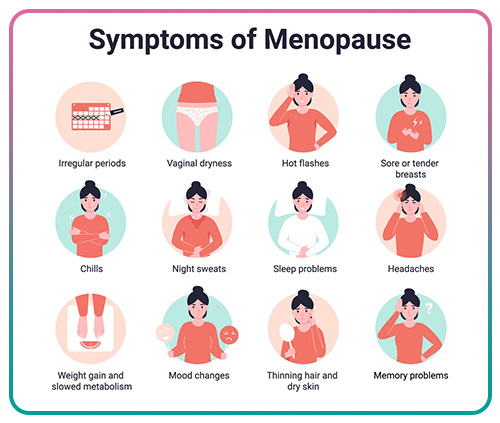
Premature menopause causes extensive changes in women’s bodies. The definitive diagnosis of premature menopause is when a woman’s monthly period stops for a year. However, menopausal symptoms usually appear before this one year. The first symptom observed in menopause is hot flashes and a sudden feeling of warmth. Hot flashes can cause red and blotchy skin and a sudden increase in heart rate. Other symptoms of early menopause include the following:
-
Irregular Menstruation
A change in the menstrual pattern is the first significant symptom of early menopause. In some women, the menstrual cycle may repeat earlier than one month, and in others, menstruation may occur every few months.
-
Night sweats
Night sweats are one of the symptoms of early menopause, which causes hot flashes during sleep. This symptom may last for several years.
-
Sleep disturbance
Early menopause can cause sleep disturbance. So some women complain about not having deep sleep or sleep problems. Sleep problems during this period can be caused by night sweats or anxiety.
-
Vaginal dryness
Vaginal dryness, itching, and discomfort can occur during the perimenopause period. During this period, the decrease in estrogen hormone causes vaginal dryness, thinning, and vulnerability to the vaginal wall tissue. Therefore, some women may experience pain during intercourse.
-
Urinary problems
Menopause can disrupt the urinary cycle. During menopause, women are more susceptible to urinary tract infections and need to go to the bathroom more often. Urinary irritation is sometimes a sign of premature menopause.
-
Emotional changes
During early menopause, women are more likely to experience depression and mood swings due to hormonal changes. In many cases, emotional changes cause sleep disturbances or decreased libido in women.
-
Concentration and learning problems
Premature menopause can affect women’s ability to concentrate and short-term memory.
-
Fertility reduction
During menopause, the level of estrogen hormone decreases significantly. This hormone controls the ovulation cycle. Hence, its diminution results in a disruption of the ovulation process and a decrease in the likelihood of pregnancy.
-
Appearance changes
Premature menopause may cause increased abdominal fat, overweight, shrinking breasts, and hair loss.
How is early menopause diagnosed?
In case of early menopause symptoms, it is necessary to see a specialist doctor. To definitively diagnose premature menopause, the doctor requests the following tests.
- Estrogen level evaluation test
- Anti-Müllerian hormone (AMH) test
- Follicle-stimulating hormone (FSH) level evaluation test
- Thyroid test
- Prolactin test
- Karyotype genetic testing
In the next step, the doctor checks the symptoms of ovarian failure with an ultrasound. In women with ovarian failure, the ovaries are smaller than normal in ultrasound, and the ovarian follicles are not of the right size and quality. (They don’t have enough growth.)
Pregnancy after premature menopause

Menopause always evokes infertility problems for women. Hormonal changes during menopause cause irregularity in the monthly periods and disrupt the ovulation process. Therefore, pregnancy during this period is difficult but not impossible. During perimenopause, ovulation may occur and the possibility of natural pregnancy still exists. Scientific studies show that about 5 to 10% of women with early menopause may ovulate and become pregnant. Learn more about pregnancy after menopause: Is It Possible to Get Pregnant After Menopause?
Early menopause is associated with a decrease in the number and quality of eggs, and this has a significant effect on women’s fertility. If a person notices the symptoms of premature menopause in time and consults a specialist doctor, it is possible to get pregnant with assisted reproductive methods such as IVF and ICSI. In these procedures, the doctor stimulates the ovaries to ovulate by prescribing hormonal drugs. After maturation, the eggs are removed from the ovaries during an outpatient procedure and fertilized with the husband’s sperm in the laboratory. Finally, high-quality embryos are transferred to the mother’s uterus. The use of assisted reproductive methods increases the chance of pregnancy in early menopause.
If the monthly period is completely stopped in early menopause, the number of eggs is greatly reduced and the remaining eggs do not have enough quality for fertility. Therefore, alternative methods should be used for pregnancy. If the wife’s sperm is of good quality, the best way to get pregnant is to do IVF with donor eggs.
Fortunately, early menopause does not disrupt the function of the uterus and the uterus can still carry out the task of pregnancy. Therefore, women suffering from early menopause can get pregnant using a donated egg.
In the egg donation method, young women who volunteer to donate eggs receive ovulation stimulation medications under the supervision of a doctor. After maturation, the eggs are picked up from the donor’s ovaries and fertilized with the recipient’s spouse’s sperm in the laboratory environment. Then, high-quality embryos are transferred to the mother’s uterus to continue growing.
In addition to premature menopause, women are also facing uterine problems; the alternative method for pregnancy is to use a donor egg and a surrogate uterus.
Premature menopause and emotional challenges

Women who experience early menopause face many emotional challenges. The feeling of unexpected loss, grief, and hopelessness to have a child and a happy family can be very distressing. If you are also facing these emotional challenges, you should know that all these feelings are normal. It is necessary to use the support of relatives and professional advisors. It is better to read about early menopause, its causes, and available ways to get pregnant and consult with doctors who are experts in this field and make an informed decision. Using alternative methods can be difficult, but choosing these methods consciously can bring happiness and peace to you and your family.
Contact us for more information about methods of pregnancy after premature menopause.
References:

